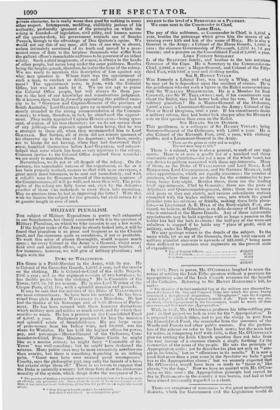In 191.3, PEEL in power, Mr. O'CONNELL laughed to scorn
the notion of settling the Irish Tithe question without a provision for appropriating some of the Irish Church revenues for the benefit of the Catholics. Referring to Sir HENRY HARDINGE'S bill, he said- " The situation, of Ireland reminded him of the military case discussed be- tween the leartA Dr. :lop and Corporal Trim, into which the grave Doctor introduced a inctiphysical disquisition. Metaphysics?' says the Corporal, what is that ? a pu,11 of the bayonet is worth it all.' There was one sin- gle word, tvbieh iiicmoun,!ed by the Government, would be worth all these measures—and that word wai Apprupriatim."
Well, in 1s37, Mr. O'Coesreee produces his tithe-settling pro- ject : in that project we look in vain for the "Appropriation." It is proposed to abolish tithes, and to pay the clergy in part from the Consolidated Fund, the remainder from the revenues of the Woods and Forests and other public sources. For the particu- lars of the scheme we refer to the Irish news; but the main fact for notice, in comparing 1837 with 1835, is that Mr.O'Coesnree's plan for settling the Irish Church question does not take from the vast income of a sinecure church a single farthing for the instruction of the mass of the people. He sets the principle of Appropriation aside: yet he describes his plan not only as "sim- ple in its details," but as "efficacious in its results." It is now a good deal more than a year since in the Spectator we bade "good bye to the Appropriation clause ;" but we scarcely expected that Mr. O'Coseeest. would have been so ready to "throw it," like physic," to the dogs." Now we have no quarrel with Mr. ()VON'. NELL on this score : the Appropriation principle had served its day in Parliament—in the country it was barren, and had at last been almost universally regarded as a cheat.


















































 Previous page
Previous page